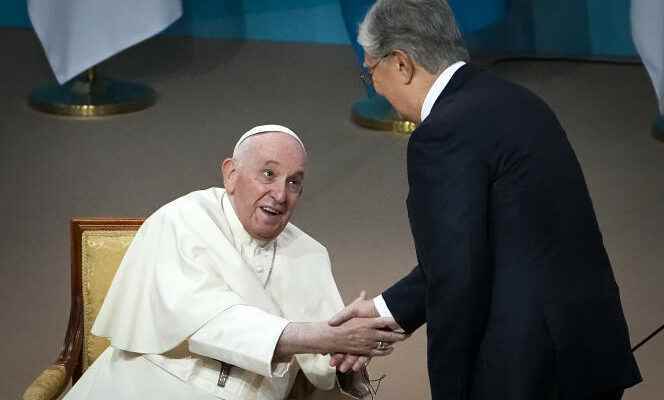Pope Francis arrived in Kazakhstan on Tuesday, September 13, for a three-day visit to a “a land as vast as it is ancient”, in his words. In terms of seniority, Astana, capital since 1997, renamed Nursultan in 2019 in homage to Nursultan Nazarbayev who led the independent country for twenty-eight years since 1991, throws the visitor the thousand reflections of its recent prestigious buildings. Placed in the middle of the steppe, they testify to the opulence drawn from the income from the raw materials of this immense country, hydrocarbons in mind.
The head of the Catholic Church, in a wheelchair, was welcomed by Kazakh President Kassym-Jomart Tokayev in the monumental state room of the presidential palace, surrounded by thirty-eight columns of faux marble and illuminated by three gigantic chandeliers of crystal. A military orchestra with a choir made thunderous national anthems resound there. The Argentine pontiff then addressed the political and diplomatic authorities gathered at the Kazakhstan Central Concert Hall.
“Crossroads of important geopolitical nodes”
Pope Francis paid tribute to the “unique multiethnic, multicultural and multireligious laboratory” of Kazakhstan and did not fail to recall “the prison camps and the mass deportations which saw, in the cities and in the infinite steppes of these regions, the oppression of so many populations”. Then in this “crossroads of important geopolitical nodes”, he launched a strong appeal to get out of the logic of “blocks” while continues “the mad and tragic war caused by the invasion of Ukraine”. Once again, on this subject, the pope avoided pronouncing the word “Russia “.
“You come at a critical time in human history, President Tokaev, whose country is trying to find its place between Russia, China and South Asia, told him in the preamble. The family of nations teeters on the edge of an abyss as geopolitical tensions rise, the global economy suffers, and proliferating religious and ethnic intolerance becomes the rule. »
While on the ground, the Ukrainian army launched a counter-offensive, the pope hoped that the governments of the countries involved would be able to create a “new spirit of Helsinki”, reference to the Finnish capital where, in 1975, during the Cold War, the Western countries and those of the Eastern bloc agreed on a declaration within the framework of the Conference on Security and Cooperation in Europe. Among the principles that the signatories undertook to respect were the sovereignty and territorial integrity of States, the inviolability of their borders, the peaceful settlement of disputes and respect for human rights and fundamental freedoms.
You have 47.3% of this article left to read. The following is for subscribers only.
